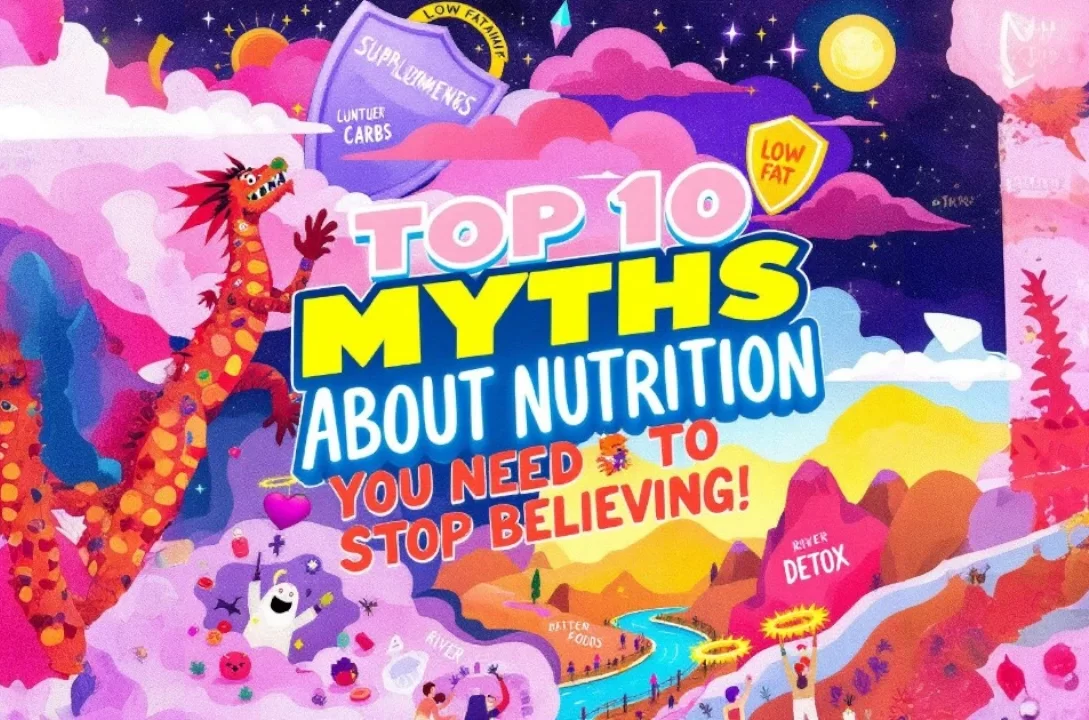Nutrition advice is everywhere—but how much of it is actually true? From “carbs make you fat” to “detox teas cleanse your body,” misinformation spreads faster than facts. These myths don’t just confuse people; they can wreck your health, metabolism, and relationship with food.
In this article, we’ll bust the top 10 most persistent nutrition myths with science-backed evidence. By the end, you’ll know exactly what to eat—and what to ignore—for real, sustainable health.
Let’s separate fact from fiction.
1. Myth: “Carbs Make You Fat”
The Truth:
- Carbs don’t inherently cause weight gain—excess calories do.
- Whole carbs (oats, quinoa, fruits) are packed with fiber, vitamins, and energy.
- Low-carb diets work for some, but they’re not necessary for everyone.
What to Do Instead:
✔ Choose whole, unprocessed carbs (sweet potatoes, brown rice).
✔ Avoid refined carbs (white bread, sugary snacks).
2. Myth: “Eating Fat Makes You Fat”
The Truth:
- Healthy fats (avocados, nuts, olive oil) support brain function and hormones.
- Studies show high-fat diets can aid weight loss (keto, Mediterranean).
- Low-fat products often replace fat with sugar and additives.
Eat More Of:
- Omega-3s (salmon, chia seeds).
- Monounsaturated fats (avocados, almonds).
3. Myth: “You Need to Detox with Juices or Teas”
The Truth:
- Your liver and kidneys naturally detox your body—no juice cleanse needed.
- Most detox teas are laxatives in disguise, causing dehydration.
- Extreme detoxes can slow metabolism and cause nutrient deficiencies.
Better Alternatives:
✔ Drink more water.
✔ Eat fiber-rich foods (veggies, legumes) to support digestion.
4. Myth: “Eggs Raise Cholesterol”
The Truth:
- Dietary cholesterol (from eggs) has little impact on blood cholesterol for most people.
- Eggs are nutrient powerhouses—high in protein, vitamins, and choline (brain health).
- Studies show up to 3 eggs per day are safe for healthy individuals.
Who Should Limit Eggs?
- People with genetic cholesterol issues (FH) should monitor intake.
5. Myth: “All Calories Are Equal”
The Truth:
- 100 calories of broccoli ≠ 100 calories of soda.
- Whole foods boost metabolism, reduce hunger, and improve gut health.
- Processed foods spike blood sugar and increase cravings.
Focus On:
- Nutrient density (more vitamins/minerals per calorie).
- Protein and fiber to stay full longer.
6. Myth: “Protein Shakes Are Necessary for Muscle Gain”
The Truth:
- You can get enough protein from whole foods (chicken, tofu, lentils).
- Many protein powders contain added sugars and artificial ingredients.
- Whole foods provide additional nutrients (iron, zinc, fiber) that shakes lack.
Best Protein Sources:
- Greek yogurt, eggs, lean meats, tempeh.
7. Myth: “Gluten-Free = Healthier”
The Truth:
- Only 1% of people have celiac disease (requires gluten-free diet).
- Many gluten-free products are high in sugar and low in fiber.
- Unless medically necessary, gluten isn’t harmful for most.
Who Should Avoid Gluten?
- Those with celiac disease or gluten sensitivity.
8. Myth: “Eating Late at Night Causes Weight Gain”
The Truth:
- Weight gain happens from total daily calories, not timing.
- Night eating only becomes a problem if you overeat junk food.
- Some people benefit from late-night protein (muscle recovery).
Tip: If you’re hungry at night, choose protein or fiber-rich snacks (cottage cheese, veggies).
9. Myth: “Organic Food Is Always Healthier”
The Truth:
- Organic farming reduces pesticides, but nutritional differences are minimal.
- Conventionally grown veggies are still healthy and affordable.
- The “Dirty Dozen” and “Clean Fifteen” lists help prioritize organic buys.
Best Bang for Your Buck:
- Buy organic for thin-skinned produce (strawberries, spinach).
- Save money on thick-skinned items (avocados, bananas).
10. Myth: “You Must Eat Small, Frequent Meals to Boost Metabolism”
The Truth:
- Meal frequency doesn’t significantly affect metabolism.
- Some people thrive on intermittent fasting (fewer, larger meals).
- What matters most: total calories and food quality.
Do What Works for You:
- Prefer 3 meals? Great.
- Like 6 small meals? Also fine.
FAQs: Nutrition Myths Debunked
Q1: Is sugar really that bad for you?
Yes—excess sugar (especially added sugar) fuels inflammation, weight gain, and diabetes risk. Natural sugars (fruit) are fine in moderation.
Q2: Do I need to take supplements?
Only if you have deficiencies (Vitamin D, B12). Whole foods are best for nutrients.
Q3: Is red meat unhealthy?
Lean red meat in moderation is rich in iron and protein. Processed meats (bacon, sausages) are linked to higher health risks.
Q4: Should I avoid salt completely?
No—sodium is essential, but most people eat too much from processed foods. Use Himalayan or sea salt in cooking instead.
Q5: Is almond milk better than cow’s milk?
Depends on your needs. Almond milk is lower in calories but lacks protein. Cow’s milk has more nutrients but isn’t dairy-free.
Conclusion: Eat Smart, Not Scared
Nutrition shouldn’t be confusing. Now that you know the truth behind these myths, you can:
✅ Enjoy carbs and fats without guilt.
✅ Skip useless detoxes.
✅ Focus on whole, balanced foods.
Your next step? Pick one myth you believed and adjust your diet accordingly. Small changes lead to big results!
Trusted Sources:
Share this with someone who needs nutrition truth—not trends! 🥑🍎















